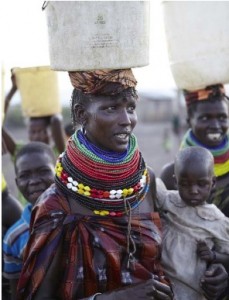
The severe famine in Somalia and other areas of East Africa grabbed headlines only when images of starving children appeared on television screens around the world. Charlie Beckett, Director of Polis, the LSE’s Media think-tank, examines a damning report on the international community’s response to the crisis – and how the media played into it.
A report from Oxfam and Save The Children on the East African food crisis shows that thousands of lives could have been saved if aid organisations had acted earlier. This was not a sudden disaster and yet not enough was done to prevent it escalating:
Early signs of an oncoming food crisis were clear many months before the emergency reached its peak. Yet it was not until the situation had reached crisis point that the international system started to respond at scale.
Jan Egeland UN Emergency Relief Coordinator 2003–2006

At this point it is usually the media that get blamed for their attention deficit disorder. But a recent report by the International Broadcasting Trust, (which is funded by NGOs to promote coverage of this kind of issue) on the East African Famine is more ambiguous. It does highlight criticism of the media’s ‘slow response’ but generally applauds serious and reasonably widespread coverage of what was a slow-moving and complex story.
Even the Oxfam/Save The Children report acknowledges that that the media is not fundamentally to blame:
“Why was the international system so slow in responding to accurate early warnings? One reason is that raising large sums for humanitarian response currently depends on getting significant media and public attention – which did not happen until the crisis point was reached. But this misses the point. Waiting for a situation to reach crisis point before responding is the wrong way to address chronic vulnerability and recurrent drought in places like the Horn of Africa.”
So it is the politicians and the civil servants who failed to respond?
Again, the Oxfam/Save The Children report is not over-simplistic. It recognises the difficulties of taking action based on forecasts. It stresses the need for structural change:
There also has to be a fundamental shift to integrated, long-term, flexible programming that aims to reduce the risks faced by people whose livelihoods are extremely vulnerable.
And that is where we come to a contradiction within the NGOs themselves. Go and look at their messaging and it is overwhelmingly about crisis, not long-term structural change. It is largely about what Western publics or politicians should do, not about regional politics. In East Africa, for example, there is no shortage of food in Kenya and even Somalia has reasonable supplies. The reason people are starving is as much about the divisive politics of those states and the exclusion of certain people from support systems. Throw in a drought and other factors such as food prices and you get severe malnutrition.
That is a much harder story to tell, of course, and one that journalists struggle with, as well as the NGO marketing departments.
But as the IBT report shows, NGOs are in a cleft stick. They want to raise funds for immediate crises, and the DEC appeal for East Africa did raise a lot of money:
“simple, direct calls to action were most effective in raising funds to alleviate immediate suffering.”
More self-aware NGOs told the IBT that they were aware of their own complicity in short-termism:
Other NGO interviewees felt that it was difficult to criticise the media for superficial coverage when their own messages were often too simplistic and failed to address the limitations of humanitarian aid in the face of the violence and political chaos in Somalia.
Polis has been working with various NGOs on this set of issues around the contradiction of short-term marketing and long-term structural change. Some NGOs claim that their fund-raising has not diminished, despite the recession, so what’s the problem? I would suggest that the excellent Oxfam/Save report suggests there is a problem with the development model in general, not just the response to the latest East African crisis.
This post first appeared on the Polis blog on 18 January.
Please read our comments policy before posting
…………………………………………………………………..
 Charlie Beckett – POLIS Director
Charlie Beckett – POLIS Director
Charlie Beckett is the first director of Polis. He has 20 years of experience with LWT, BBC and ITN’s Channel 4 News. He broadcasts and writes regularly on media and political affairs and is the author of SuperMedia: Saving Journalism So It Can Save The World (Blackwell, 2008). He teaches at the LSE and LCC. Director’s Blog He is also a trustee for The Media Society, Article 19 and the International Development Institute.
Read articles by Charlie Beckett





